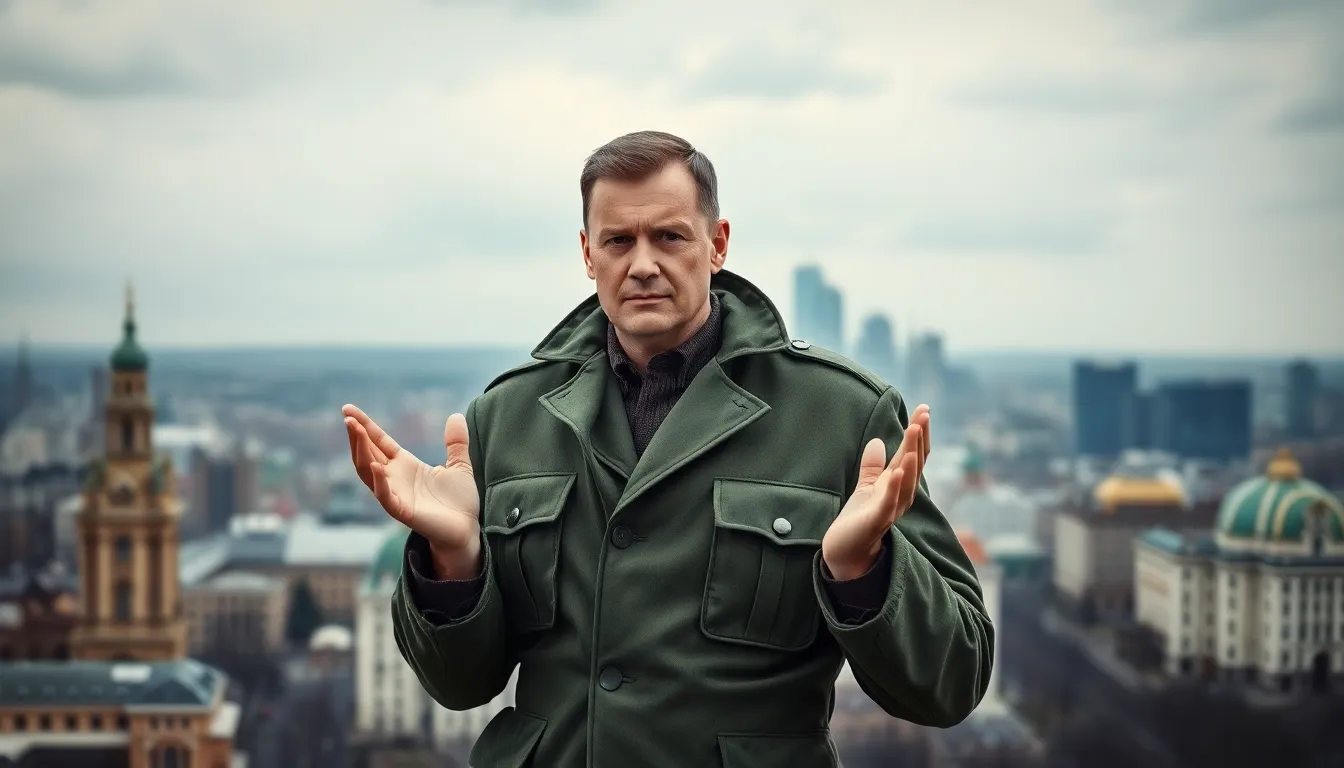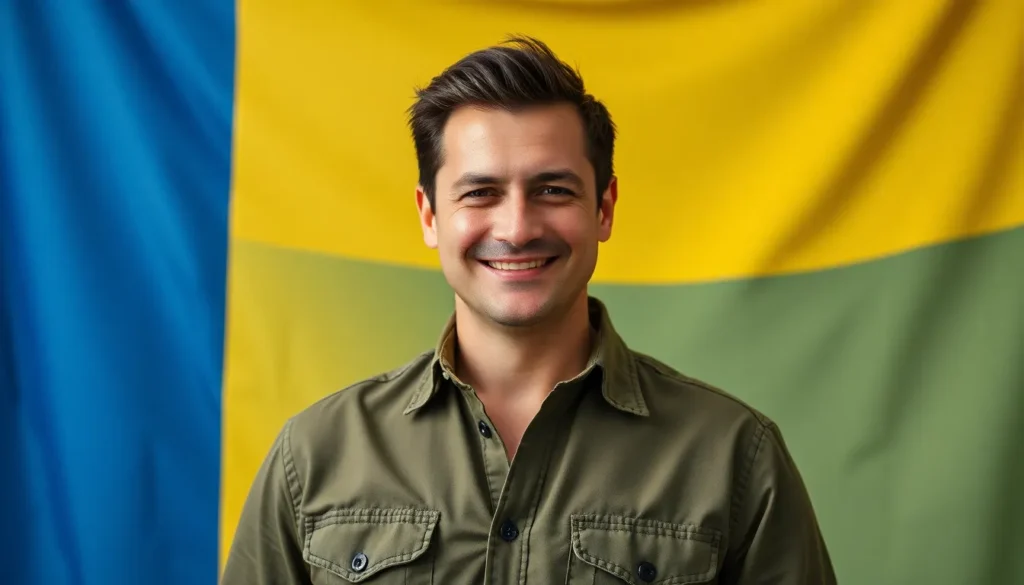In the world of politics, few figures have captured global attention like Volodymyr Zelensky. The former comedian turned Ukrainian president has become a household name, but the question lingers: is he a good guy? With a knack for delivering heartfelt speeches and rallying his nation in the face of adversity, he’s certainly got the charisma to win hearts.
Yet, as with any public figure, opinions vary. Some see him as a beacon of hope, while others remain skeptical of his motives. Is he the hero Ukraine needs or just another player in the political game? Buckle up as we dive into the complexities of Zelensky’s character and explore what makes him tick—because in the realm of politics, things are rarely black and white.
Table of Contents
ToggleOverview of Zelensky’s Background
Volodymyr Zelensky, born on January 25, 1978, in Kryvyi Rih, Ukraine, started his career in entertainment. His initial foray into acting starred in a popular Ukrainian TV series, “Servant of the People,” where he portrayed a teacher who unexpectedly becomes president. That role resonated with the public, contributing to his eventual political career.
In 2019, Zelensky transitioned from comedy to politics, winning the presidential election with approximately 73% of the vote. His campaign emphasized anti-corruption measures and governmental reform. The combination of his outsider status and relatable persona appealed to many Ukrainian citizens.
During his presidency, Zelensky faced numerous challenges, including ongoing tensions with Russia and the COVID-19 pandemic. He demonstrated strong leadership through crisis communication, often addressing the nation directly via social media. His ability to unify diverse political factions gained him recognition on the global stage.
Zelensky’s response to the Russian invasion of Ukraine in February 2022 further solidified his role as a symbol of resilience. Despite the violent conflict, he remained in Kyiv, providing a steady source of hope and encouragement for Ukrainians battling for their sovereignty. His diplomatic efforts to garner international support showcased his dedication to Ukraine’s interests.
Controversies surrounding Zelensky’s presidency include accusations of cronyism and political maneuvering. Those who criticize him often point to challenges in achieving his reform agenda. Evaluating his complex character reveals a mix of public support and skepticism, highlighting the nuanced nature of his leadership in these turbulent times.
Political Rise and Key Policies

Volodymyr Zelensky’s ascent to power showcases a blend of charisma and resilience, reflecting the shifting landscape of Ukrainian politics. His notable leadership during crises and significant domestic achievements contribute to his complex legacy.
Leadership During Crisis
Zelensky’s response to the 2022 Russian invasion remains a defining moment of his presidency. His steadfast presence in Kyiv inspired fellow Ukrainians, showcasing courage under fire. He utilized social media effectively to communicate updates and rally support, fostering national unity during dire moments. Global leaders praised his ability to articulate Ukraine’s plight, marking him as a prominent voice on the international stage. Moreover, his adept handling of the COVID-19 pandemic further demonstrated his commitment to public health and safety amid turmoil. Zelensky’s leadership style emphasizes transparency and direct engagement, crucially influencing public morale during challenging times.
Domestic Achievements
Domestically, Zelensky championed anti-corruption measures that addressed longstanding issues within Ukraine. His administration implemented reforms aimed at enhancing governmental accountability and transparency. Legislative efforts focused on judicial reforms attracted both domestic and international attention, signaling a commitment to a more just legal framework. Innovations in public service delivery sought to improve citizens’ experiences with government institutions. Furthermore, his emphasis on digital governance advanced Ukraine’s technological capabilities. While his administration faced hurdles, these initiatives reflect a determined push for modernization in Ukraine’s political fabric.
International Perception of Zelensky
Global views on Volodymyr Zelensky vary significantly due to his multifaceted leadership style during challenging times.
Support from Western Allies
Western allies largely regard Zelensky as a critical ally against Russian aggression. His direct appeals for military and humanitarian aid resonate strongly with foreign leaders. For instance, multiple nations have pledged millions in support, bolstering Ukraine’s defense capabilities. Reports indicate that U.S. assistance alone has reached over $60 billion since the onset of the invasion. Leaders from NATO countries demonstrate consistent backing, recognizing his role in maintaining regional stability. Public admiration for his resoluteness further strengthens bilateral relations with the West.
Criticism and Controversies
Despite robust support, Zelensky faces significant criticism and controversies. Detractors highlight his administration’s struggle with corruption, reflecting ongoing challenges in governance. Accusations of cronyism and political maneuvers arise, raising eyebrows among critics. Opposition figures and political analysts question the effectiveness of his reforms, arguing they lack substantial progress. Additionally, intrusive privacy laws spark debate over civil liberties. Balancing public expectation and political reality complicates his leadership, highlighting the political nuances of his presidency.
Is Zelensky a Good Guy?
Volodymyr Zelensky’s character elicits diverse opinions, prompting examination of his actions and leadership style.
Arguments Supporting the Idea
Supporters often highlight Zelensky’s resilience during the Russian invasion. He remained in Ukraine, inspiring citizens with strong communication and unwavering commitment to sovereignty. His leadership during crises reflects dedication to national unity and public health, particularly evident during COVID-19. Anti-corruption measures and judicial reforms underline his commitment to transparency, aiming to modernize Ukraine’s governance. Various allies recognize him as a crucial ally against Russian aggression, securing substantial military and humanitarian assistance, underscoring international support for his leadership.
Counterarguments and Critiques
Critics raise concerns about Zelensky’s administration grappling with corruption. Accusations of cronyism and ineffective reforms have sparked debates on transparency. Privacy laws enacted under his watch, perceived as intrusive, invoke worries over civil liberties. Skeptics argue that despite his impressive rhetoric, meaningful reforms lack sufficient implementation. While he commands significant public support, these critiques reveal complexities of his governance amidst ongoing tensions and struggles for accountability.
Personal Life and Values
Volodymyr Zelensky embodies a blend of personal values and public persona that resonate with many Ukrainians. He maintains a strong focus on family, which shines through in his public statements and actions. Family plays a significant role in his life, influencing his views on leadership and governance. His relationship with his wife, Olena Zelenska, and their children showcases a commitment to maintaining a semblance of normalcy amidst political chaos.
Culturally, Zelensky draws on his Ukrainian heritage to convey messages of unity and resilience. His background in entertainment allows him to connect with diverse audiences effectively. Inspired by his upbringing, he often emphasizes the importance of education and equal opportunities. The portrayal of a relatable figure stands out in his narrative, helping him maintain popularity among citizens.
Philanthropic efforts illustrate his dedication to societal welfare. Zelensky has engaged in initiatives aimed at supporting children in need, showcasing a focus on future generations. His administration promotes democratic values and civic engagement, reflecting his belief in a participatory political landscape.
Challenges faced during his presidency highlight his commitment to transparency. Advocates for anti-corruption measures demonstrate his desire for accountability within the government. Public perception remains mixed as critics question the effectiveness of reforms amid ongoing issues. In essence, his approach to leadership seeks to balance international diplomacy with domestic needs, reiterating his values of honesty and responsibility in governance.
Ukraine’s turbulent history influences his political decisions, making strides toward modernization a priority. Zelensky’s personal life, grounded in family and culture, feeds into his vision for a united and progressive Ukraine.
Evaluating Volodymyr Zelensky’s character reveals a multifaceted leader navigating the complexities of modern politics. His ability to unify and inspire during crises showcases a dedication to his nation. However, the controversies surrounding his administration highlight the challenges inherent in leadership.
Zelensky’s commitment to reform and transparency reflects a desire for progress, yet skepticism remains regarding the effectiveness of these initiatives. Ultimately, opinions on his character will likely continue to vary as he balances domestic challenges with international expectations. Understanding Zelensky requires looking beyond the surface, recognizing the nuances that define his leadership in a turbulent political landscape.




